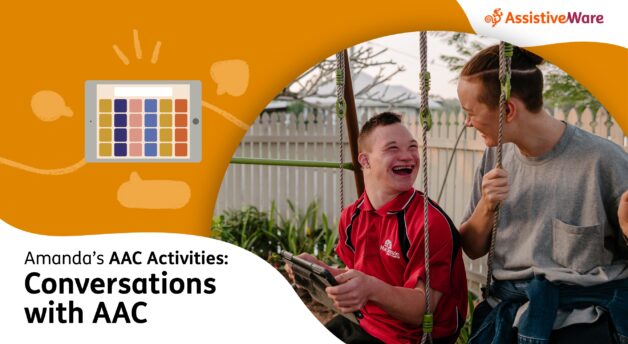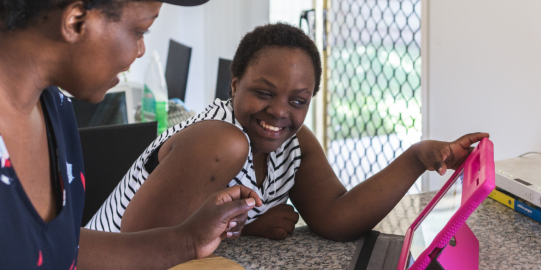Conversations are where news, ideas, and feelings are shared. These chats happen daily, and they often move quickly through a variety of topics. Sometimes we start talking about the activity in front of us, but often the topic shifts to life, interests and plans.
How can an AAC user participate meaningfully in conversations? Do they have the words, vocabulary and language they need to join? Are they given time to contribute? Do they know how to start a conversation?
How can we prepare an AAC user when conversations are unpredictable?
Having the right AAC tool
An AAC user is more likely to join a conversation if they have a full robust AAC system. Combining the words available in an AAC tool gives us a way to communicate unique messages. At first, an AAC user may use these words and sentences to ask for things, but in time, they can learn to use the vocabulary to participate in conversations, join discussions, and tell stories.
Authorship
Don’t put AAC users in the passive position of using language that has been pre-prepared for them. It is far more powerful to work together to discuss and plan phrases and sentences for different situations and conversations. Involve the AAC user and, if appropriate, involve their peers and siblings as well. Do not program a long list of things that you think they would want to say. Let it be their own words.
For example, you may say, ‘I don’t like that’ as a phrase, but the AAC user, having listened in his peers, may want to say ‘That sucks’. Don’t assume that you know the best words.
There are many ways to give authorship to the AAC user so they can join a conversation on their own terms.
5 ways to prepare for conversations
Topics can change quickly in conversations, often making it difficult for an AAC user to join in. It can help to pre-plan and save messages in the AAC system to allow quick, easy and meaningful participation.
1. Generic Phrases
Work with the AAC user to plan, write and save generic phrases that can be used during conversations.
These can be generic positive or negative comments - small messages that tells others that the AAC user is following the conversation and agrees or disagrees. For example: “That’s awesome!”, “Way to go!”, “No way!”, “Bummer”, etc.
You can also use clarifying or questioning phrases, eg. “Please say that again.”
A variety of messages for different situations can be helpful.
2. Specific Phrases
Work with the AAC user to plan, write, and save specific phrases that can be used during conversations in specific situations.
This can involve thinking about and discussing things that might come up in a specific situation. Think about conversations in past situations. Write sentences and phrases that may be fast and useful.
For example, when going shopping with some birthday money, prepared phrases might include: “How much does this cost?”, “I will spend all my birthday money!”, “Shopped till we dropped!”, etc.
Other examples include:
- Community outings - the AAC user can plan messages they will need (eg. Asking for the right shoes at bowling).
- Appointments - the AAC user can write statements and/or questions they need for medical or therapy appointments
- Specific phrases about the AAC user’s preferred topics of conversation
3. Conversation Starters
Work with AAC users to plan, write and save statements and questions that can start conversations. Topics can include those that are of interest to the AAC user or their friends and family.
Some examples include: “Have you seen the latest computer game?”, “I’m so excited about the holidays”, “I’m going out for dinner on the weekend, where is good to eat?”, “What movies have you seen lately?”.
Photos, videos, Pictello stories, and even social media can also provide good starting points for conversations. Showing a photo, sharing a Pictello story, or showing something you have seen on Instagram can start a conversation.
4. News and Stories
Often we have interesting and exciting things that have happened or are going to happen. Sharing these with friends and family can be a great way to get a conversation going. eg. “Guess what I am doing on the weekend?”.
Work with an AAC user to plan and write important news and stories.
These can be saved into the AAC system for quick access in any conversation.
5. Phrases to manage the behavior of speaking people.
In conversations, speaking people do not allow time; they frequently interrupt and speak over AAC users. AAC user need to advocate for themselves in these situations. Saved phrases that manage the behavior of speaking people can be particularly helpful.
For example: “Please wait while I write my message”, “Can you give me a minute?”, “I have an idea”, “I haven’t finished!”, “Hang on!?!”, etc.
Planning ahead to participate in a conversation is only one part of the solution. AAC users also need time and opportunity to join. Communication Partners can support AAC users in conversations in a way that suits their needs.
AAC users have the right to be respected and their thoughts and opinions heard in conversations. Let’s work together to support this.





